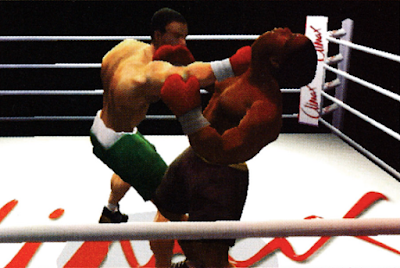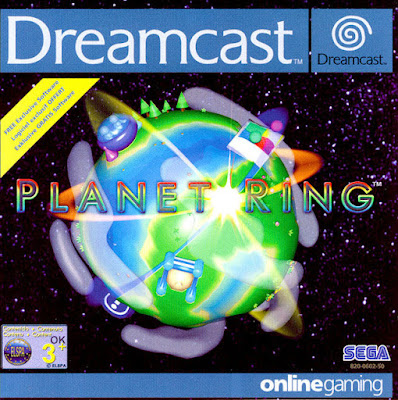Think boxing on the Dreamcast and no doubt your mind will be instantly transported to the cacophonous auditoria of Midway's infamous Ready 2 Rumble; an ebullient Afro Thunder pacing around the ring with the kind of swagger only normally reserved for arcade boxers that looked - through a contemporary lens, at least - like playable CGI creations.
Yes Ready 2 Rumble and its sequel Ready 2 Rumble: Round 2 pretty much had the boxing genre sewn up on the Dreamcast; so while other systems before and since have enjoyed a wealth of options when it comes to digital pugilism, Sega's own great white (now possibly yellowing) hope only played host to the two Midway propositions. This is especially curious since previous Sega systems offered an embarrassment of riches when it came to boxing titles, with games like Greatest Heavyweights on the Mega Drive and Victory Boxing on the Saturn being two particular highlights from my own sordid youth. Arguably the most famous boxing franchise of all time is Punch-Out!!, but seeing as I was a Sega kid, I never really dabbled with those games until later on.

At the risk of turning this into a stroll down my personal memory lane of boxing games, it's time to take a detour through a lesser-travelled ginnel. See, the Dreamcast may have only received the two Ready 2 Rumble titles as officially released boxing games, but there was scheduled a mandatory challenger to face Midway's undisputed champion. In the opposite corner to Ready 2 Rumble, and hailing from the south coast of England, wearing superlative hi-res visuals and offering an impressive array of inventive gameplay modes, stood Climax Studios' Title Defense.
Or at least it did, before the camera panned back around and it had vanished from the ring leaving nought but the faint whiff of Ralgex and dissappointment.
 |
| Source: DC-UK / Out of Print Archive |
Announced in March 2000 by Portsmouth, Hampshire based Climax Studios, Title Defense promised a more realistic simulation style approach to boxing for the Dreamcast. Acutely aware of the long, muscle-bound shadow cast by Ready 2 Rumble, the game's designers were keen to distance Title Defense from Midway's arcade rooted punch fest at seemingly any and every opportunity. While not a Dreamcast exclusive, the fact that the Dreamcast was the only 'next-gen' console gamers could actually purchase at the time of Title Defense's announcement meant that it was the lead platform in many ways; and also presumably the reason Sega's system was the focus for a lot of the early media.
"Climax today announced it has begun development on Title Defense, a cutting-edge boxing game for PC, Dreamcast, Nintendo Dolphin, PlayStation 2 and X-Box. As addictive as a pure arcade game, but as detailed as a serious simulation, Title Defense is being designed to provide the all-round thump-'em up experience that previous boxing games have failed to deliver.
"Making full use of the power in PCs and next-gen consoles, Title Defense will use high-resolution 3D graphics to bring TV-style mug-punching to glorious life. It promises to be a heavyweight game in every respect, weighing in with a fluid control system, advanced AI and punch-by-punch interactive commentary."
- Climax Studios, 9th March 2000
In the months following the initial press release, various members of Climax Studios' development team were interviewed by the gaming press, extolling the virtues of their Ready 2 Rumble-killer, and detailed the various features and gameplay modes that Title Defense would offer over the competition. The game was also featured in magazines of the era, with UK Dreamcast magazine DC-UK printing a four page spread focussed solely on Climax Studios' upcoming Dreamcast releases in the June 2000 edition. Naturally, this feature included a 'first look' at Title Defense, which showcased the game's impressive graphics and detailed some of the modes players could look forward to.
 |
| Source: DC-UK / Out of Print Archive |
These modes included a sparring session, an exhibition fight mode, a curious sounding 'shadow boxing' mode (in which players would spar against a 'ghost' version of their own fights, apparently), and of course a full on career mode.
Speaking to IGN in May 2000, Climax Studios' Business Development Manager Chris Eden said: "There's a career mode in there, yeah. The plan is, in terms of game modes, there will be a sort of straightforward arcade style mode where you'll go through and you'll fight 'X' many fighters, yeah? That's something we really need to do to keep the arcade gamers happy. But what we plan to do is put in a career mode, that'll require so much progression into the game. And that's something people hadn't really thought about before. For example if you look at real life how many fights does a boxer have? What's the level of opponents they fight? Things like that. Boxing isn't a sport where you fight anybody all the time, and games like Ready 2 Rumble don't show the hard work behind a boxing career or anything like that. Something we're sort of looking at as well is a small management mode where you'd be able to manage a stable of boxers and you'd be able to take part in the fight itself."
 |
| DC-UK's Climax Studios feature, July 2000 |
It wasn't just the variety in gameplay options that impressed though. The visuals, from the scant screens that were available looked truly outstanding. While clearly very early, the shots that were shared with magazines and websites of the era depict some excellently detailed character models - somewhat reminiscent of the superb models seen in Ultimate Fighting Championship - and some large (albeit empty) venues which would no doubt have eventually have been filled with roaring crowds.
Again speaking to IGN, Chris Eden stated: "Title Defense is mainly really nice technology. People talk about physics as the new Rock and Roll in games and that's true, we've got a very detailed physics model in Title Defense and it allows us to model where the muscles work, and stuff like that. When the characters move, the muscles bulge and deform realistically, that's essentially how it works. And that is what will set us apart from games like Ready 2 Rumble, this total realism, like watching a boxing match, the movement the physics of it all."
What's especially interesting about the visuals of Title Defense is that the fighters were apparently not animated using motion capture of real boxers, but instead relied on manual hand animation. This time speaking to Game Interviews, Chris Eden said: "The game is fully hand animated at the moment. We did toy with the idea of using motion capture but to us the benefits of animation outweighed those of mo-cap."
Alas, there is no known video footage of Title Defense in motion, so quite how well this animation style held up is something of a mystery at this point, but still an interesting little fact to note.
 |
| Source: DC-UK / Out of Print Archive |
While Climax were quick to point out that Title Defense was at the opposite end of the spectrum to Ready 2 Rumble when it came to gameplay and feel, the one similarity both games would share would be the lack of any official boxing license, with EA Sports having the exclusive rights to real world fighters tied up in its pre-Fight Night era Knockout Kings franchise.
"EA has most of the boxing licenses sewn up, I think. As we've seen with Ready 2 Rumble and other games, a license isn't necessary for boxing as it is for like football, yeah? If you look down the line and looking at a boxing game, we've got this idea of this game with a player to interact with, and an awful lot of the people you meet are going to be other players," Chris went on to explain during his interview with IGN. "In a game world like we envisage people will generate their own reputations and careers. Licenses are essentially about having pre-generated reputations that you're up against, yeah? But if you start thinking about a boxing universe then reputations get generated by players, which I think is far more interesting."

























.png)

























